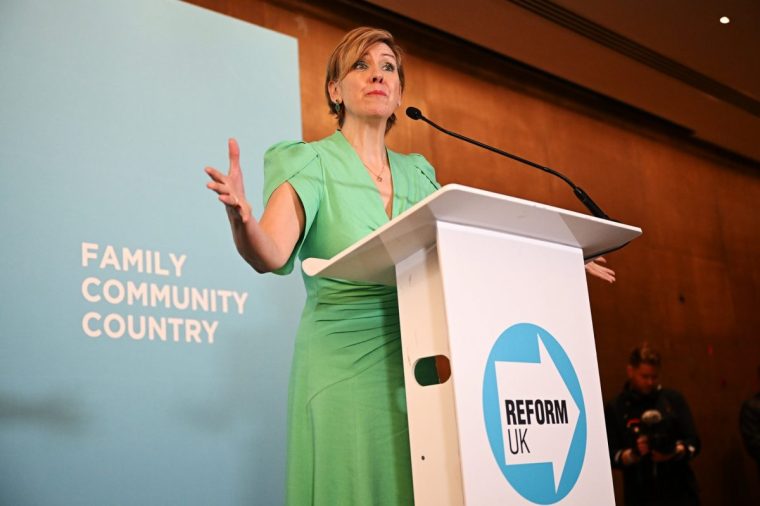As Nigel Farage sees his Reform Party closing the gap in the polls, he is seeking to capitalise on the momentum to cause a political earthquake at next May’s local elections.
The election will see 2,240 councillors elected in 32 councils and polls for six mayors will also take place. Reform will be fighting all these contests with a particular gusto and sees success in May paving the way for a Nigel Farage premiership in 2029.
Reform’s deputy leader Richard Tice is in bullish mood.
“We want to win the next general election and we’re aiming for the magic number of winning 326 seats,” says Tice. “Nigel is now equal in the betting odds to become prime minister at the next election and we’ve got momentum with us.
“People know that our policies are what’s going to turn the country around, turn the economy around.”
Farage’s right-hand man says the party will demonstrate that voters are increasingly getting behind Reform.
“We’re not confident about anything,” he says. “We are ambitious that we’ll put in an excellent performance.”
The party has got some areas of England worried, particularly in Labour-controlled Thurrock in Essex. It only has one councillor at present, but it sits in the constituency that elected one of five Reform MPs.
“We’re aware that Reform presents a serious threat to us in Thurrock,” says one long term Labour councillor, who asked not to be named. “I expect the party will be putting in a lot of effort, diverting members from all around the regions to help in the effort to keep Reform from winning.”
The Tories had plunged the council into effective bankruptcy with £1.5bn of debt before Labour took control last May.
“We’ll be targeting key areas like Thurrock, and we think we can do extremely well,” adds Tice.
Quite what policies Reform will present to the voters in the north Essex town will be firmed up over the next few months, but Tice does provide a hint of what the party hopes will persuade the electorate over to its side.
One is to promise voters in Thurrock, as well as other target councils, to end “wokeness” in local authorities.
“There’s a whole bunch of ridiculous diversity, equality and inclusion jobs in councils,” he says. “There’s a whole bunch of translation jobs. There’s so much low hanging fruit. There’s just the whole way that places around the procurement contracts and much more.
“But we will set out our full policy agenda in the coming months, which will reflect what people around the country have been crying out for, sensible and commonsense leadership.”
John Kent, the Labour leader of Thurrock Council, cannot bring himself to even mention the word “Reform”. Instead, he mounts a vociferous defence of his administration’s performance in Thurrock.
“The Conservatives bankrupted Thurrock Council, running up debts of £1.5bn, saddling residents with 18 per cent council tax rises, over two years, and reduced services,” says Kent. “Quite rightly, local folk are very angry – and so am I.
“Under Labour, we have restored rural busses, kept our local theatre open, launched our Thurrock Cares and Pensioner Winter Support Fund to ensure the most vulnerable are protected this winter and will keep this year’s council tax increase to the capping level.”
Alex Anderson, the one councillor Reform already has in Thurrock, adds a little more to what the party’s local election manifesto could contain. And those hoping for continued financial support to LGBTQ and council staff working to help minority communities may well be disappointed.
“We’ll be looking at those sorts of issues, of course,” says Anderson, who defected from the Tories to Reform in September.
Those hoping for more homes to be built for locals struggling to get on the housing ladder may well be disappointed, according to Anderson.
“People really aren’t particularly impressed with you know the idea of much too much building on the green belt.”
Reform has gained much of its support with a promise to cut the number of both illegal and legal immigrants coming into the UK.
“The first thing you have got to do as a nation is stop mass immigration,” says Tice, fully aware that running a council or several and have the odd regional mayor is not going to solve that conundrum.
“No, you can’t control immigration from a council, sadly,” he says. “But what we’ll show is that part of our policies and when people see we can run their local council then they’ll trust us to sort out mass immigration.”
Another part of East England that Reform has its eye on is in Lincolnshire, where Tice sits as the MP for Boston.
Not only is Reform “optimistic for success” in Labour run Thurrock, it is also hopeful of overturning almost three decades of Conservative rule in the county.
The current leader of Lincolnshire County Council does not take kindly to Reform talking his patch up as a target.
“This appears to me to be something Reform considers a stepping stone to a wider national campaign. The people of Lincolnshire are not interested in being the stepping stone for Nigel Farage,” says Lincolnshire Conservative council leader Martin Hill, who has led the council since 2005.
“Most of our services are either good or even top of the tree. Our council tax is one of the lowest in the country.
“I’m not sure Reform is really interested in local services. This is about who’s going to be running your council services. Basically, this is a first step towards Reform gaining ground in the run-up to the next general election. But this is a local election that’s really important for delivering local services.
“After all, they have never run anything and there’s no evidence that they will be able to.”

Not only is Lincolnshire a council target for Reform, the Greater Lincolnshire Combined Authority will be voting for its first regional mayor in May.
Reform’s candidate is former Conservative MP Andrea Jenkyns, who lost her seat in Parliament in Morley and Outwood in West Yorkshire to Labour at the last general election. She defected to Reform in November with the promise of a shot at the mayoralty.
In an effort to show she is not merely being parachuted into Lincolnshire by her new party, Jenkyns is keen to point out that much of her life was spent in the county before she became an MP 90 miles north in 2015.
“I’ve got a footprint in Lincolnshire,” she says. “I went to school in North Lincolnshire and to the University of Lincoln.
“I was a Lincolnshire county councillor and worked right across Greater Lincolnshire. I only moved to west Yorkshire to take on and beat Ed Balls in 2015.”
As for her chances of victory in the mayoral contest, Jenkyns is confident that she will have the full backing of her party, which she believes will give her every resource she needs to get the party’s message out to voters.
“This is a very important race to Reform,” she adds. “They’re going to throw everything at it to, to get the first elected mayor of Greater Lincolnshire. We are fully going for this.”
No doubt her rivals in the mayoral race, including Labour’s Jason Stockwood and the Conservative’s Rob Waltham, are already forging plans to stop her.
It is not only Tice and Farage who are confident of success for Reform next May.
Paul Whiteley, professor of government at the University of Essex, said Reform chances of winning control of a council or a mayoralty were “pretty good if the current polling holds up”.
However he adds that it should be borne in mind that much of Reform’s vote in the general election was a protest vote.
“What I mean by this is that it was voters who were disillusioned with both Labour and the Conservatives, and so opted for another national party,” adds Whiteley. “Most of these came from the Conservatives, just as most Green votes came from Labour.
“It means that if voting intentions stay where they are at the moment, which is Labour, the Conservatives and Reform close together then the party will win seats in May. But the voting intentions are very volatile.”
Professor Tony Travers of the London School of Economics comes to a similar conclusion but believes winning control of a local authority and running services will also pose a problem.
“There’s no left or right wing way of emptying a dustbin,” he says. “There’s only the quality of the services.
“Certainly, the nearer they get to government and being in government, the greater the risk of being found out.”

If Labour and the Conservatives were not scared of Reform last week, they were this week when the potential financial clout that Reform could have in the coming years was presented to them in one ominous photograph.
The sight of Farage and his new party treasurer, the real estate millionaire Nick Candy, either side of Elon Musk at Donald Trump’s Mar a Lago estate in Florida would have sent shivers down the spine of all political rivals.
With or without Musk’s financial support, Farage’s deputy Tice is convinced the party will be matching the donations handed to their rivals in the coming years.
“It would be great if Mr Musk gives us some money, but we’re getting call from all sort of successful business people who are saying: ‘I’m either going to leave the country or back you guys to save the country at the next election.’ It’s as simple as that.”

Tice is also keen to emphasise how Reform is becoming a more professional outfit, one controlled by its growing membership and not by a company controlled by him and Farage.
He claims the party will be larger than that of the Tories’ 130,000 paid up supports before next May’s elections.
“We have over 100,000 members already, 400 branches established across the country. We are professionalising and growing the infrastructure.”
After next May’s poll, Tice is looking towards the Welsh Senedd and Scottish Parliament elections 12 months later with quite some optimism.
However, Professor Travers suggests that while Reform is likely to perform well in Wales in May 2026, there is one key hurdle to overcome.
The current first past the post system of voting in Wales will be replaced by a closed-list version of proportional representation.
“Oddly enough, given Reform’s desire for a PR system at general elections, they might have a greater chance of winning in Wales under first past the post,” says Travers. “With proportional representation, there’s less of a chance.
“In the Senedd elections in 2026 we could well be looking at a situation where no party has a majority, and then we’re looking at the possibility of a grand coalition, potentially among parties who form unusual alliances to keep Reform out of power.”
If May’s elections go as successful as Tice hopes, then it will give the party the opportunity to show voters that they can run something rather than simply shout loudly from the sidelines. And if it can do that, then it might really be a Spring to remember for Reform.


Liz Truss needs to take her own advice, and cease and desist